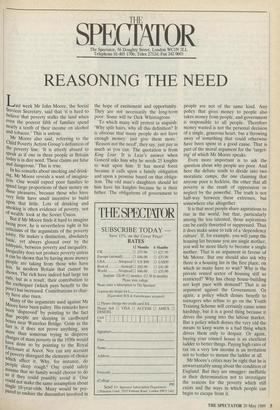SPECT THE AT OR The Spectator, 56 Doughty Street, London WC1N 2LL
Telephone 01-405 1706; Telex 27124; Fax 242 0603
REASONING THE NEED
Last week Mr John Moore, the Social Services Secretary, said that 'it is hard to believe that poverty stalks the land when even the poorest fifth of families spend nearly a tenth of their income on alcohol and tobacco.' This is untrue.
Mr Moore also said, referring to the Child Poverty Action Group's definition of the poverty line: 'It is utterly absurd to speak as if one in three people in Britain today is in dire need. These claims are false and dangerous.' This is true. In his remarks about smoking and drink- "? 8, Mr Moore reveals a want of imagina- tion. One would expect poor families to spend large proportions of their money on these pleasures, because those who have very little have small incentive to build Von that little. Lots of drinking and smoking is often evidence of poverty, not of wealth: look at the Soviet Union.
But if Mr Moore finds it hard to imagine being poor, he is nevertheless right in his criticisms of the arguments of the poverty lobby. He makes a distinction, absolutely basic, yet always glossed over by the lobbyists, between poverty and inequality. Inequality does not produce poverty unless It can be shown that by having more money People are taking from those who have less. In modern Britain that cannot be shown. The rich have indeed had large tax cuts, but as a result, their contribution to the exchequer (which pays benefit to the Poor) has increased. Contributions to char- ity have also risen. Many of the arguments used against Mr Moore have been paltry. His remarks have been 'disproved' by pointing to the fact that people are sleeping in cardboard boxes near Waterloo Bridge. Grim as the fact is, it does not prove anything, any More than someone trying to disprove charges of mass poverty in the 1930s would have done so by pointing to the Royal Enclosure at Ascot. Nor can any account of poverty disregard the elements of choice Which affect it. Why, for instance, do People sleep rough? One could safely assume that no family would choose to do se if they could possibly avoid it. One could not make the same assumption about single 18-year-olds. Many would be pre- Pared to endure the discomfort involved in
the hope of excitement and opportunity. They are not necessarily the long-term poor. Some will be Dick Whittingtons.
To which many will protest in anguish: `Why split hairs, why all this definition? It is obvious that many people do not have enough money: just give them more.' `Reason not the need', they say, just pay as much as you can. The quotation is from King Lear. It is Lear's answer when Goneril asks him why he needs 25 knights to wait upon him. It has moral force because it calls upon a family obligation and upon a promise based on that obliga- tion. The old man's daughters should let him have his knights because he is their father. The obligations of government to people are not of the same kind. Any policy that gives money to people also takes money from people, and government is responsible to all people. Therefore money wasted is not the personal decision of a single, generous heart, but a throwing away of something that could otherwise have been spent in a good cause. That is part of the moral argument for the 'target- ing' of which Mr Moore speaks.
Even more important is to ask the question about why people are poor. And here the debate tends to divide into two moralistic camps, the one claiming that anyone poor is feckless, the other that all poverty is the result of oppression or neglect by the powerful. The truth is not half-way between these extremes, but somewhere else altogether.
It is that most people share aspirations to rise in the world, but that, particularly among the less talented, those aspirations can be easily thwarted or suppressed. Thus it does make sense to talk of a 'dependency culture'. If, for example, you will jump the housing list because you are single mother, you will be more likely to become a single mother. That is an argument in favour of Mr Moore. But one should also ask why there is a housing list in the first place, on which so many have to wait? Why is the private rented sector of housing still so restricted? Why has cheap house-building not kept pace with demand? That is an argument against the Government. Or again, a policy which denies benefit to teenagers who refuse to go on the Youth Training Scheme will certainly cause some hardship, but it is a good thing because it drives the young into the labour market. But a policy which denies the very old the means to keep warm is a bad thing which drives them only to despair. Or again, buying your council house is an excellent ladder to better things. Paying high rates of tax on a very low income is an invitation not to bother to mount the ladder at all.
Mr Moore's critics may be right that he is unwarrantably smug about the condition of England. But they are smugger: ineffable in their determination not to investigate the reasons for the poverty which still exists and the ways in which people can begin to escape from it.


































































 Previous page
Previous page